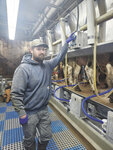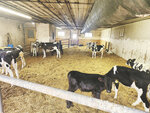


HOLY CROSS, Iowa — Before the ink dried on the land contract Robert Nosbisch signed with his mentors, Dan and Laurie Clemen, he was back in the barn milking cows as he had been doing for the past 12 years.
The only difference was that he was the proud owner of the farm and all the cattle and machinery on it.
“I didn’t know them from Adam when I started, and it has worked out well; I have no complaints,” Nosbisch said. “There was a lot of trust involved. You’ve got to have patience.”
Nosbisch milks 160 cows in a double-8 parallel parlor and crops 280 acres. His heifers are raised down the road in facilities of which he also assumed ownership.
The trust was established when Nosbisch was a dairy nutritionist for the couple. Fresh out of college, Nosbisch wanted to farm but wanted to try a career in nutrition first.
Dan Clemen was looking for help, so Nosbisch began working part time to help with chores. Eventually, the desire to farm won. He quit his nutrition job to work as a salaried employee for Clemen for five years.
The goal for Nosbisch to take over the farm was mutual from the beginning. Nosbisch took over picking out bulls for breeding and making feed decisions and cropping plans within the first couple of years of working for Clemen.
“He said if you are going to buy them all, you might as well pick the bulls,” Nosbisch said. “He took my opinion with a grain of salt but also showed me that sometimes it’s a long process, and you can’t have everything you want right away. It takes time to make money to pay for things you want to change.”
Before taking ownership of the operation, Nosbisch worked on halves for two years. On Jan. 1, he bought the rest of the cows and later that month purchased the rest of the ground on a land contract. Nosbisch said the Farm Service Agency has offered help through various beginning farmer programs.
Cows are housed in two freestall barns. Milking takes about 2.5 hours with the help of a part-time high school student and a full-time laborer. Nosbisch’s wife works off the farm, and their young son spends afternoons watching his dad milk cows.
Calves are raised in a renovated hog barn with an automatic feeder. The upgrade came about five years ago. Nosbisch said the ventilation system leaves something to be desired but has been resulting in healthy calves thus far.
Heifers are brought back to the dairy once they are pregnant. Nosbisch would like to raise all the heifers on one site to eliminate trucking them back and forth.
Milk is shipped to Prairie Farms Dairy in Dubuque. Nosbisch credits the creamery for making the transition possible with good milk prices and a well-managed market. He was able to obtain the market right before the creamery implemented a quota system.
“We were milking the most we’ve ever milked right before the quota, so that helped us a lot,” Nosbisch said. “I haven’t had to buy any quota, and that’s also why we get paid more.”
Everything that is grown on 280 acres is used for feed. Additional corn and hay is purchased. Cows are fed a total mixed ration of corn and alfalfa. Feed is stored in silage bags, but Nosbisch plans to upgrade to bunker silos.
“Bags take up a larger footprint,” Nosbisch said. “We have all the equipment to use bunkers except the packing tractors. Bunkers take up less space.”
Nosbisch also plans to lean on technology for updates. First, he plans to install activity collars on the cows within the next year to help with the challenges of breeding and move him toward his long-term goals.
“I’m going to do everything I can without building new to improve efficiency and make things easier,” Nosbisch said. “For a smaller dairy like me, the goal is to make it profitable with less labor.”
Nosbisch hopes that by becoming more efficient, he will be able to convert to a robotic milking system within the decade.
“If you don’t have goals, you’re just spinning your tires,” Nosbisch said. “You’ve got to take it day by day but also have some ambitious goals.”
Comments
No comments on this item Please log in to comment by clicking here